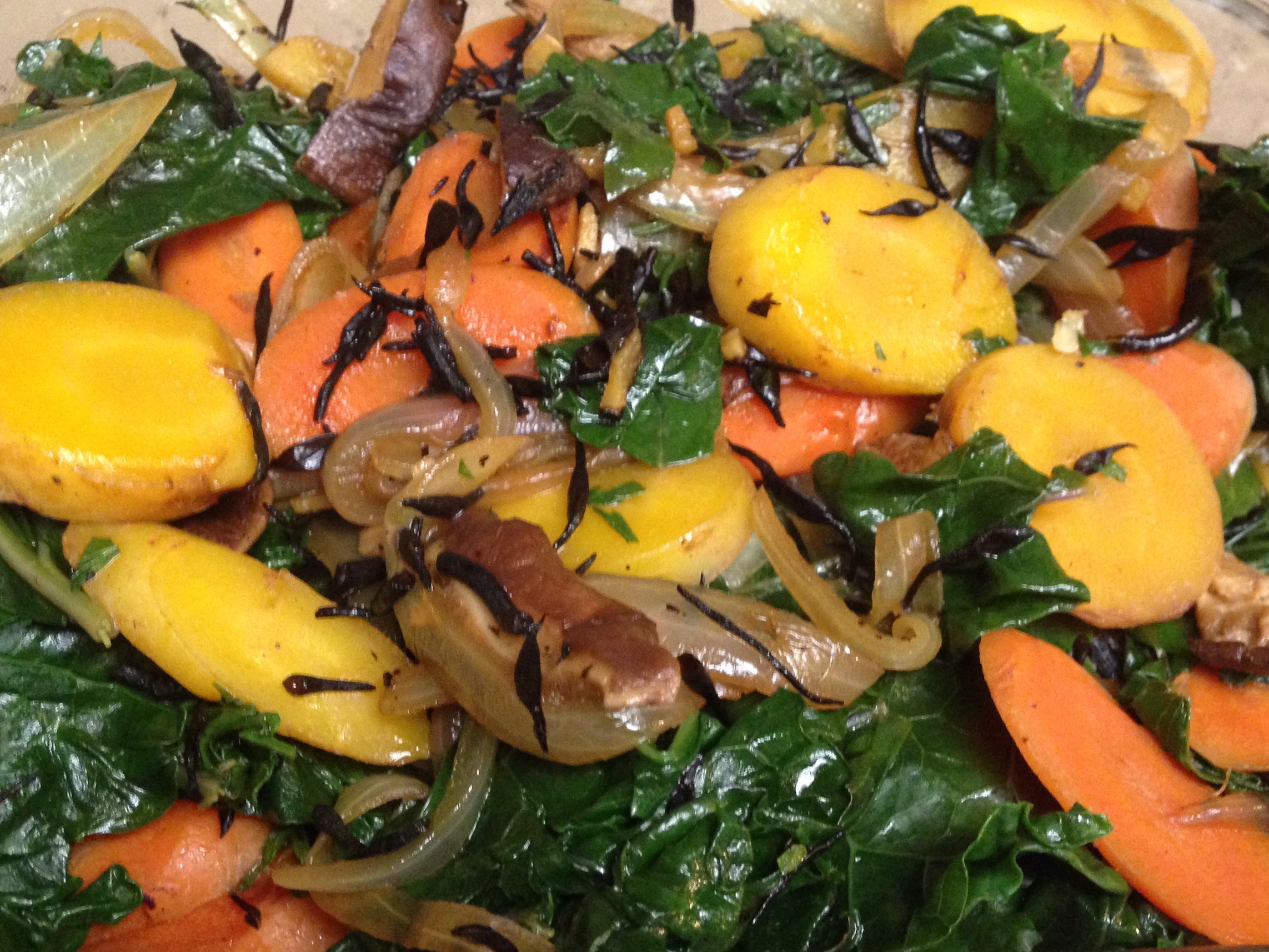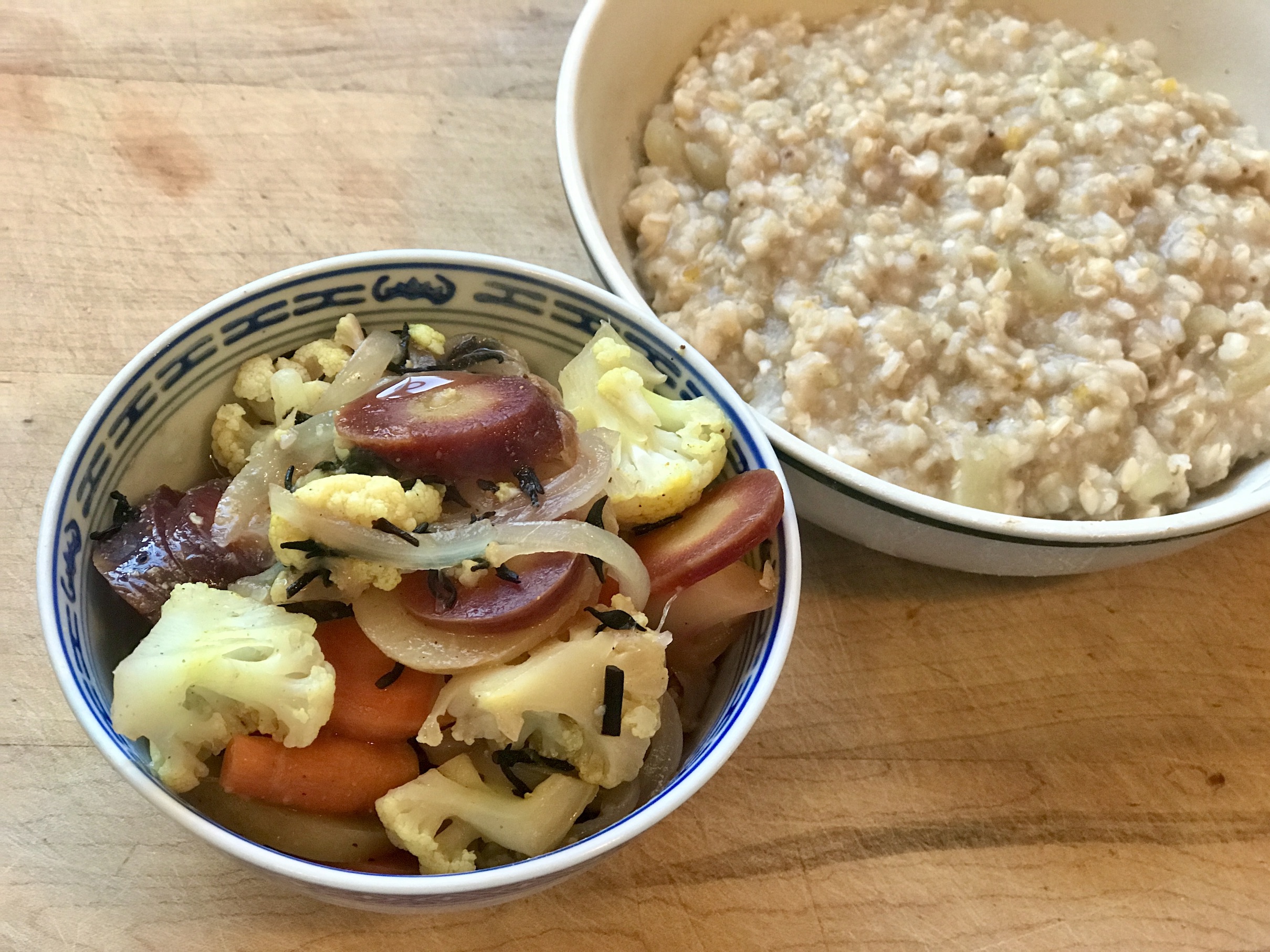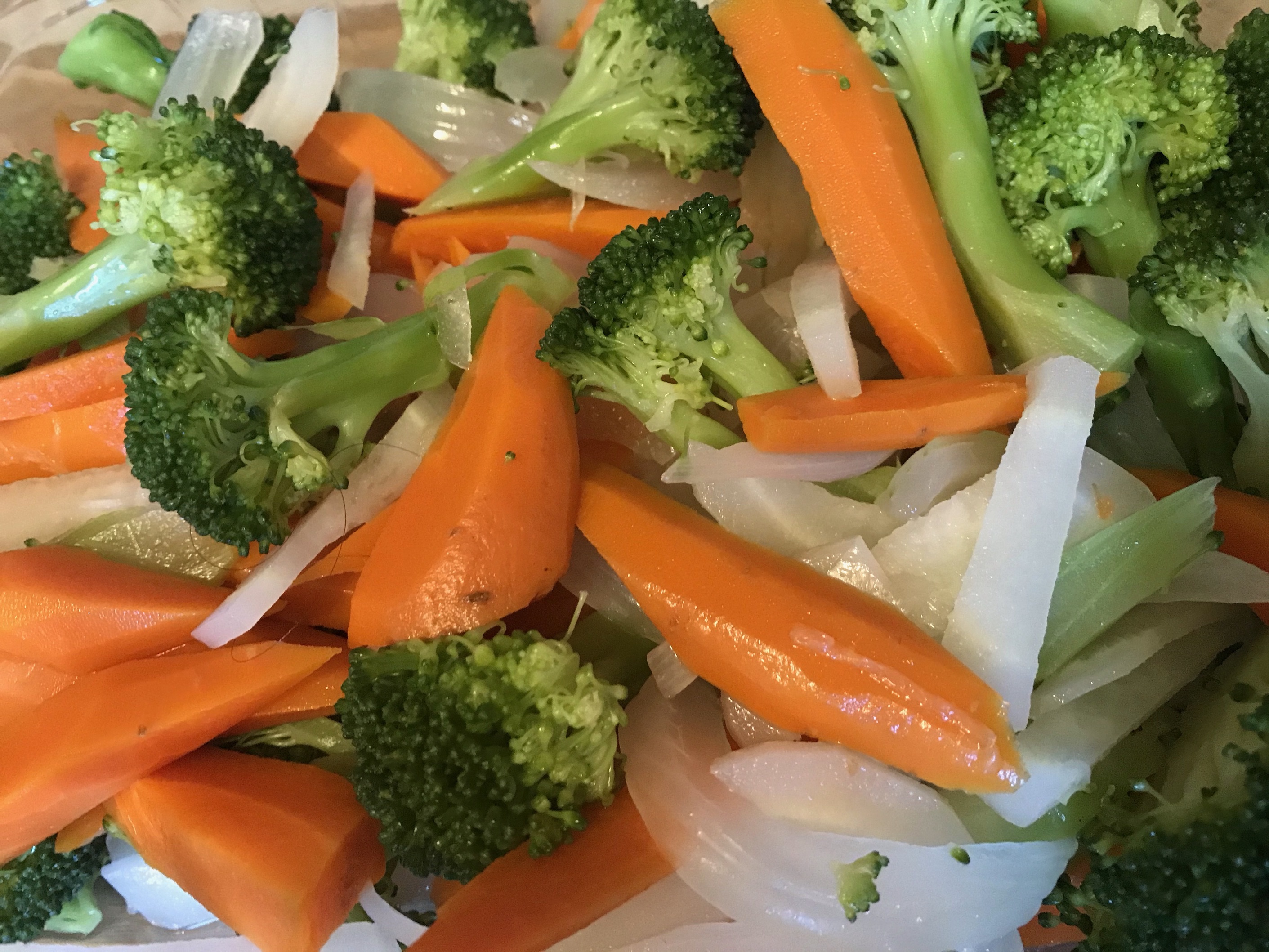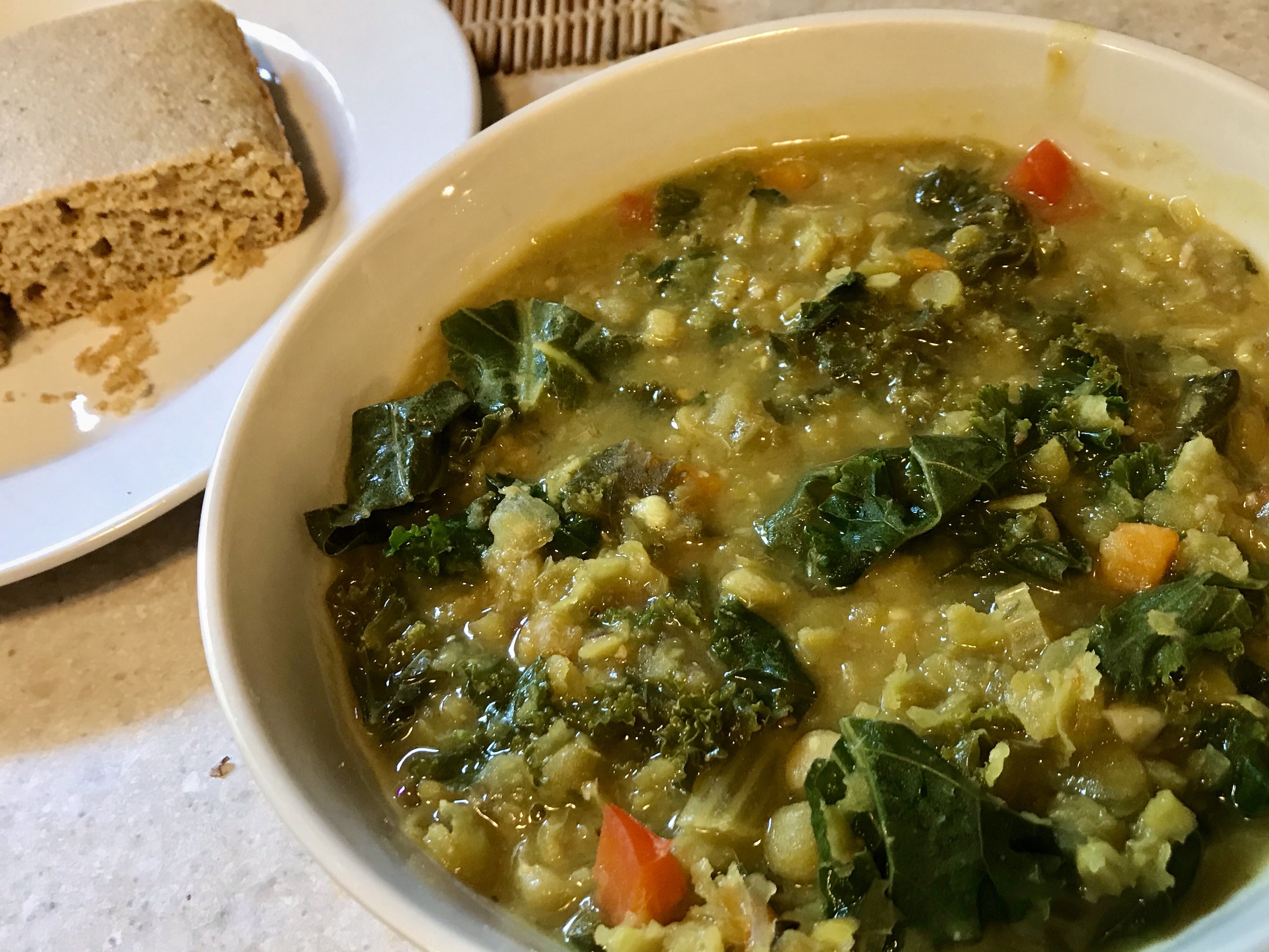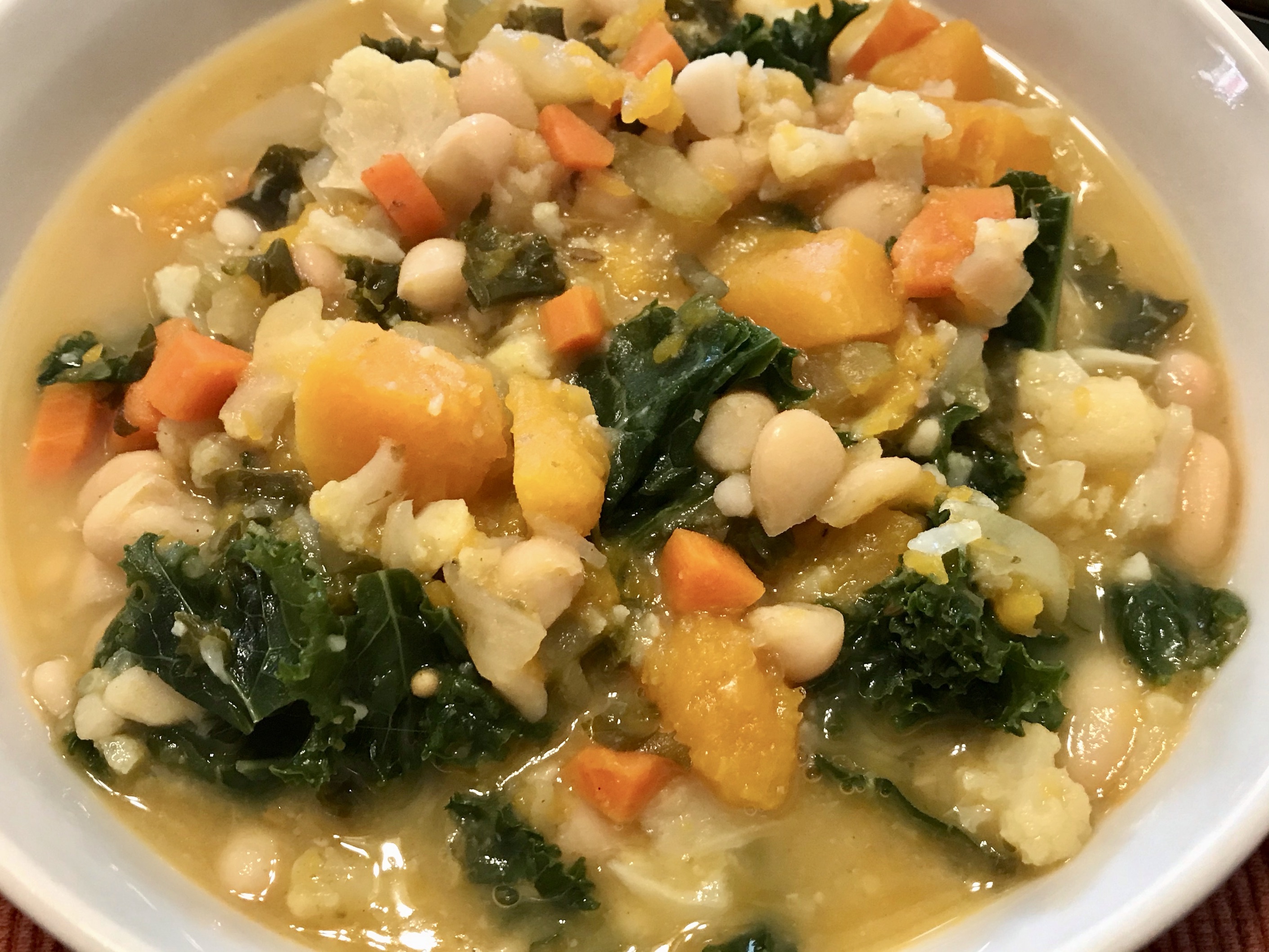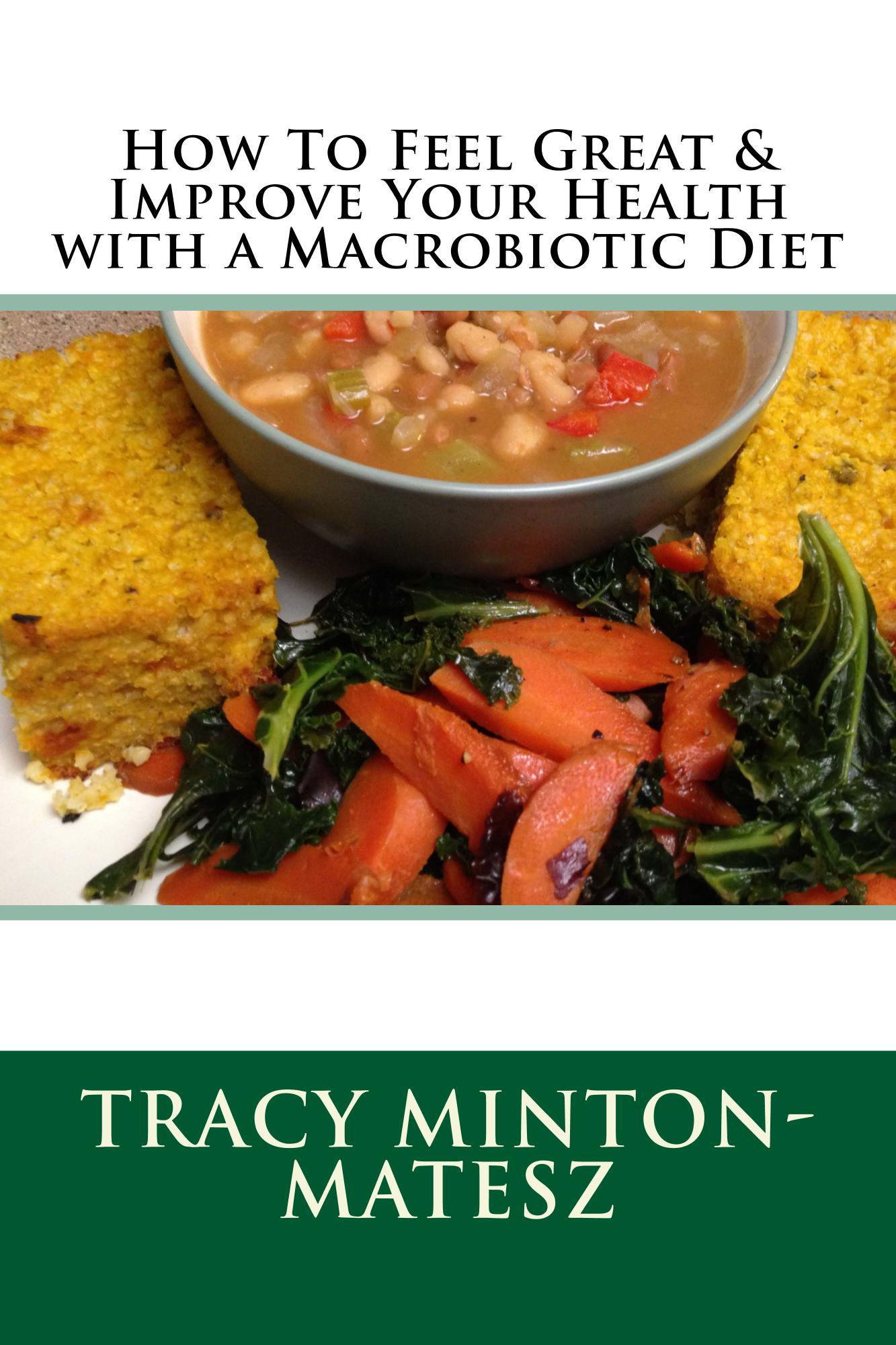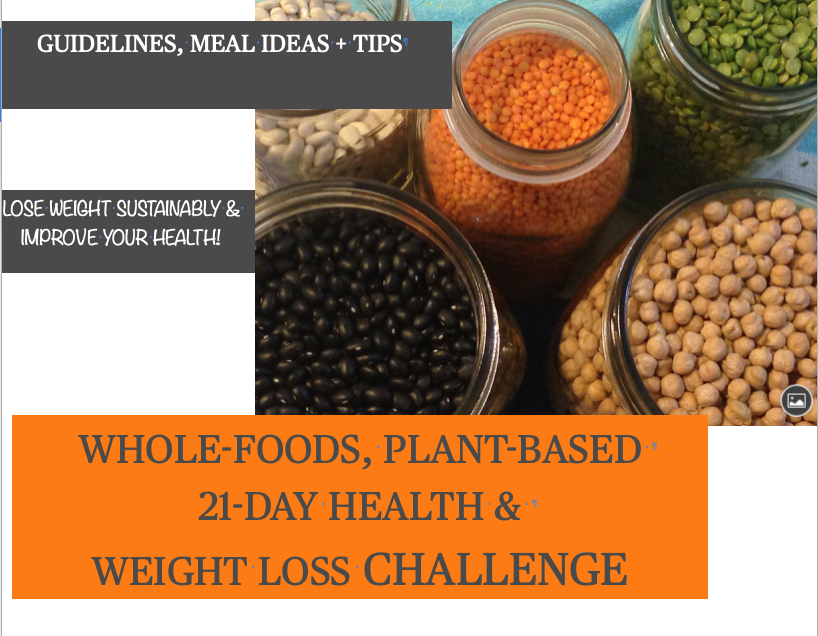Health Benefits of Carrots
The health benefits of carrots are many! Carrots are among the top ten most popularly consumed vegetables in America, with potatoes, onions, tomatoes, lettuce and bell peppers leading the charge. According to Statista, the average American consumed 8.39 pounds of carrots in 2022, whereas the average per capita consumption of potatoes was 29.3 pounds in 2021, down from 47.1 pounds in 2000, the number one consumed vegetable.
According to Wikipedia, the wild carrot (Daucus carota) is a biennial plant in the umbellifer family, Apiaceae, likely originating in Persia, and native to Europe and Southwestern Asia. The most common carrots are orange colored, however, there are several different colored heirloom variants, including white, yellow, red, purple and black. Both the tap roots and the frilly, rosette leaves are edible.
So let's look into some of the health benefits of ~ and uses for ~ carrots.
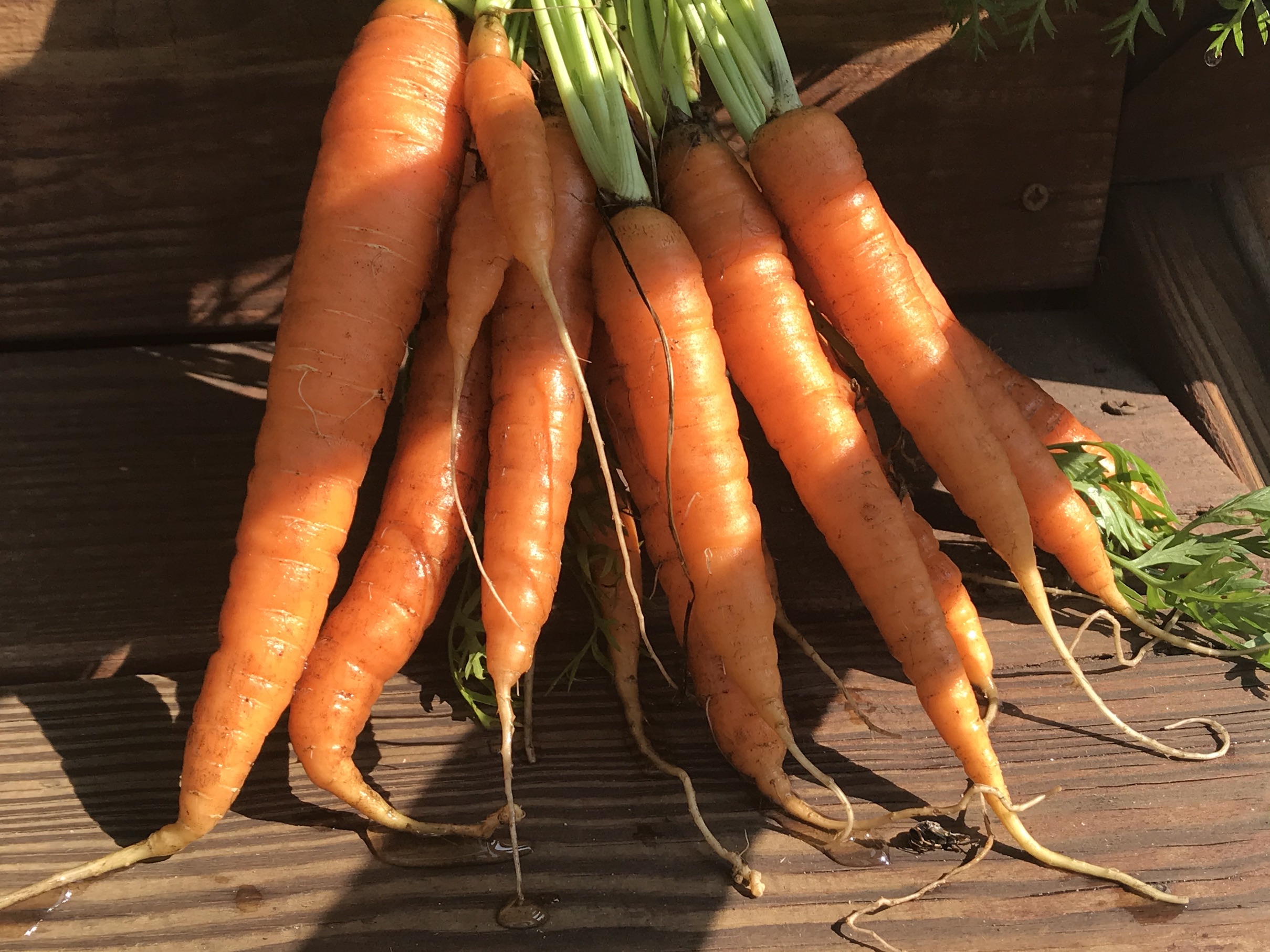 Nothing like homegrown carrots!
Nothing like homegrown carrots!So What's in Carrots that Makes Them so Healthy?
The many health benefits of carrots are found in both the roots, which contain high quantities of phytonutrients alpha- and beta-carotene, lycopene, anthocyanins and lutein (also found in tomatoes); antioxidants including vitamin A, and vitamin C, and several other vitamins and minerals.
According to the information reported from the Nutrition Coordinating Center Food and Nutrient Database (NCCDB) on Cronometer, 1 61g medium carrot contains:
25 calories, .6g of protein, 5.8g of carbs, .1 g of fat, 1.7g of fiber, small amounts of all the B vitamins, including .6mg of B3 (Niacin), .2mg of B5 (Pantothenic acid), and .1mg of B1 (Thiamine); 5.4mg of choline, 11.6mg of folate, 5054ug of beta-carotene, 156ug of lutein + zeaxanthin, .6ug of lycopene, 3.6mg of Vitamin C, .5mg of Vitamin E, 5.1ug of Vitamin K, 20mg of Calcium, 195mg of Potassium, along with small amounts of magnesium, manganese, phosphorus, selenium, and sodium.
The health benefits of carrots is amplified in some of the different heirloom variants. According to this abstract by Singh and Karmakar:
"The storage root of cultivated carrot...is one of the richest sources of various pigments...It is broadly categorized into two segments, i.e., anthocyanin/purple group (Black and Rainbow carrot) and carotenoid group (Orange, Red and Yellow carrot) on the basis of the presence of root pigments. Black carrot root is comprised with dark purple (solid purple) pigmentation of both root exterior...and interior...and is one of the greatest sources of anthocyanins possessing very high anti oxidative ability."
Further, "The roots of black carrot are an excellent source of plant-derived anthocyanins (211 mg/100 g FW), phenolics (268 mg GAW/100 g FW) and flavonoids (119 mg / CE/100 g FW);"
According to Wikipedia, black carrots contain 250-300 mg/100 g fresh root weight of anthocyanins, and hence "possesses high antioxidant ability i.e. almost 20-35 times higher than red/orange carrots and five times higher than beetroot."
In addition to more phenolic compounds and carotenoids, the carrot tops, or greens boost nutrition with more Vitamin A, calcium, iron, and fiber.
What all this means is that there are many health benefits to carrots! Of course the carotenoid group of carrots are great sources of beta-carotene, each type offering different health protective benefits.
Some of the many health benefits of carrots
Antioxidants, such as anthocyanins, carotenoids, and polyacetylene, provided by carrots play important roles in preventing disease.
Carotenoids are known to be good for disease prevention, including prevention of cancer, cerebrovascular disease (CVD), human immunodeficiency virus (HIV), cataracts, and other eye disorders.
According to this abstract, "Vitamin A (VitA) is a micronutrient that is crucial for maintaining vision, promoting growth and development, and protecting epithelium and mucus integrity in the body. VitA is known as an anti-inflammation vitamin because of its critical role in enhancing immune function. VitA is involved in the development of the immune system and plays regulatory roles in cellular immune responses and humoral immune processes."
Anthocyanins have also been reported to have many health benefits, including prevention of cardiovascular diseases, anticarcinogenic activity, control of diabetes, and improvement of vision.
The health benefits of carrots extend to our digestive health due at least in part to its fiber content, explained, below.
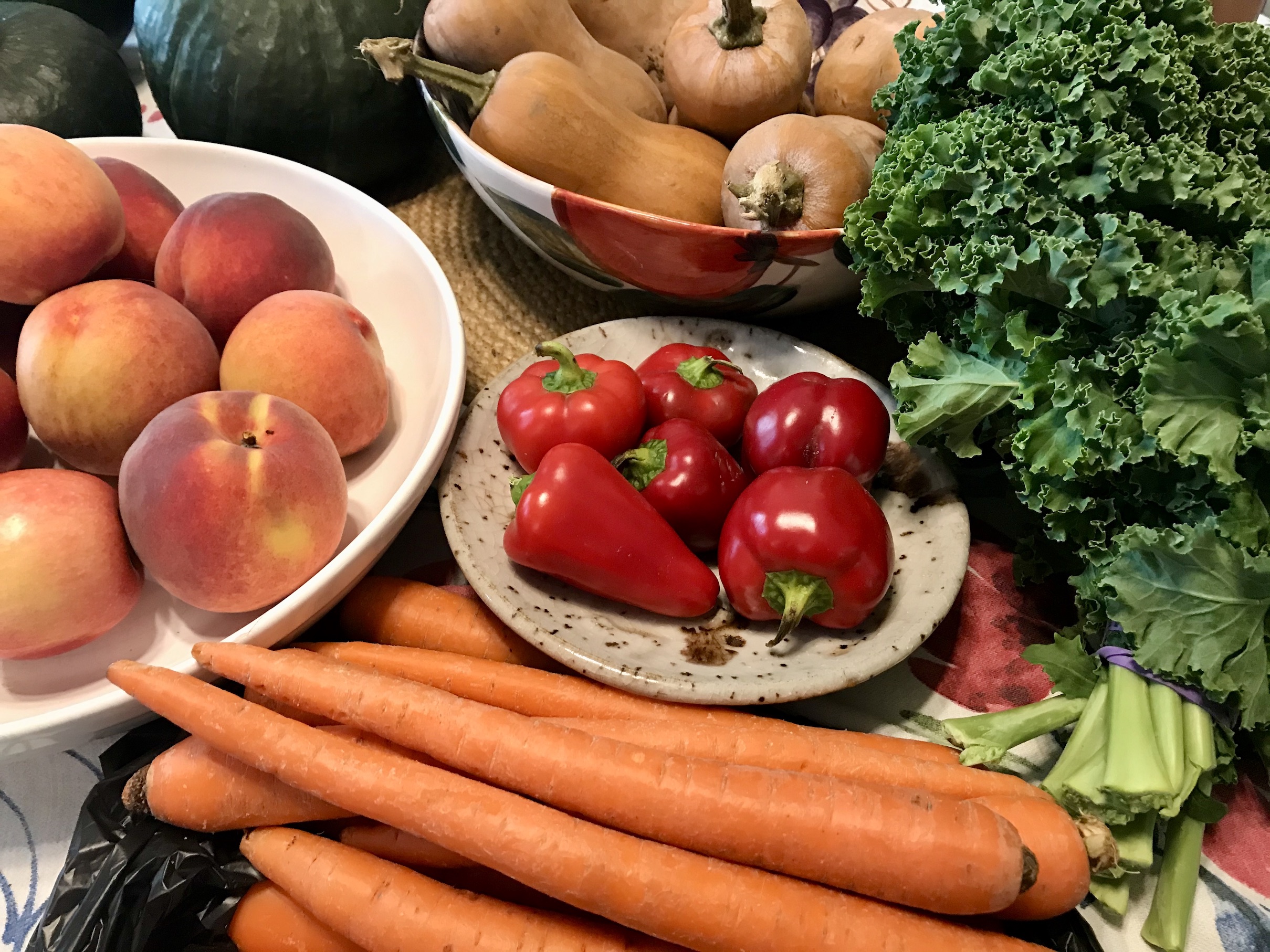
The health benefits of fiber
Dietary fiber is well known and popular as a healthy substance within society (although most people consume less than 20g daily.) The widely known benefit of dietary fiber is its role in improving gastrointestinal function.
In Health Essentials, the Cleveland Clinic includes among the benefits of dietary fiber:
- Better digestive health through increased regularity ~
- Prevent and control High Blood Pressure (HBP) through it's cholesterol lowering effects
- Decreased risk for colorectal cancer
- Blood sugar management, helping reduce risk for diabetes
- Weight management
- Increased lifespan ~ and that's what Macrobiotics is all about! Enjoying a better quality, healthier, longer life!
There are differences between soluble (dissolves in water) and insoluble (does not dissolve in water) fiber.
Soluble fiber produces a gel-like substance that can lower cholesterol and blood sugar levels, and reduce your body's ability to absorb fat. (Hello fat weight loss!)
Great Sources of Soluble Fiber Include:
- Carrots!!!!
- Apples
- Oats & Barley (Be sure to try my Rolled Barley & Oat Porridge!)
- Beans & Peas
- Citrus fruits
- Psyllium
Insoluble fiber can improve bowel health by enhancing peristalsis (motility) and increasing the bulk of feces, essentially keeping your pipes flowing with greater regularity.
Great Sources of Insoluble fiber Include:
- Beans
- Whole wheat, and products made with 100% whole wheat (flour, pasta, bulgur / cracked wheat)
- Nuts
- Cruciferous vegetables, green beans, potatoes, and carrots!!!
- Berries
Recently, there has been a greater focus on studying the gut microbiome. Complex carbohydrates ~ the primary foods on a vegan / plant-based macrobiotic diet ~ rich in both soluble and insoluble fiber produces healthy microbes which further boost immune health.
For a great book for all things fiber related, check out Fiber Fueled, or his follow-up Fiber Fueled Cookbook, by Will Bulsiewicz, MD.
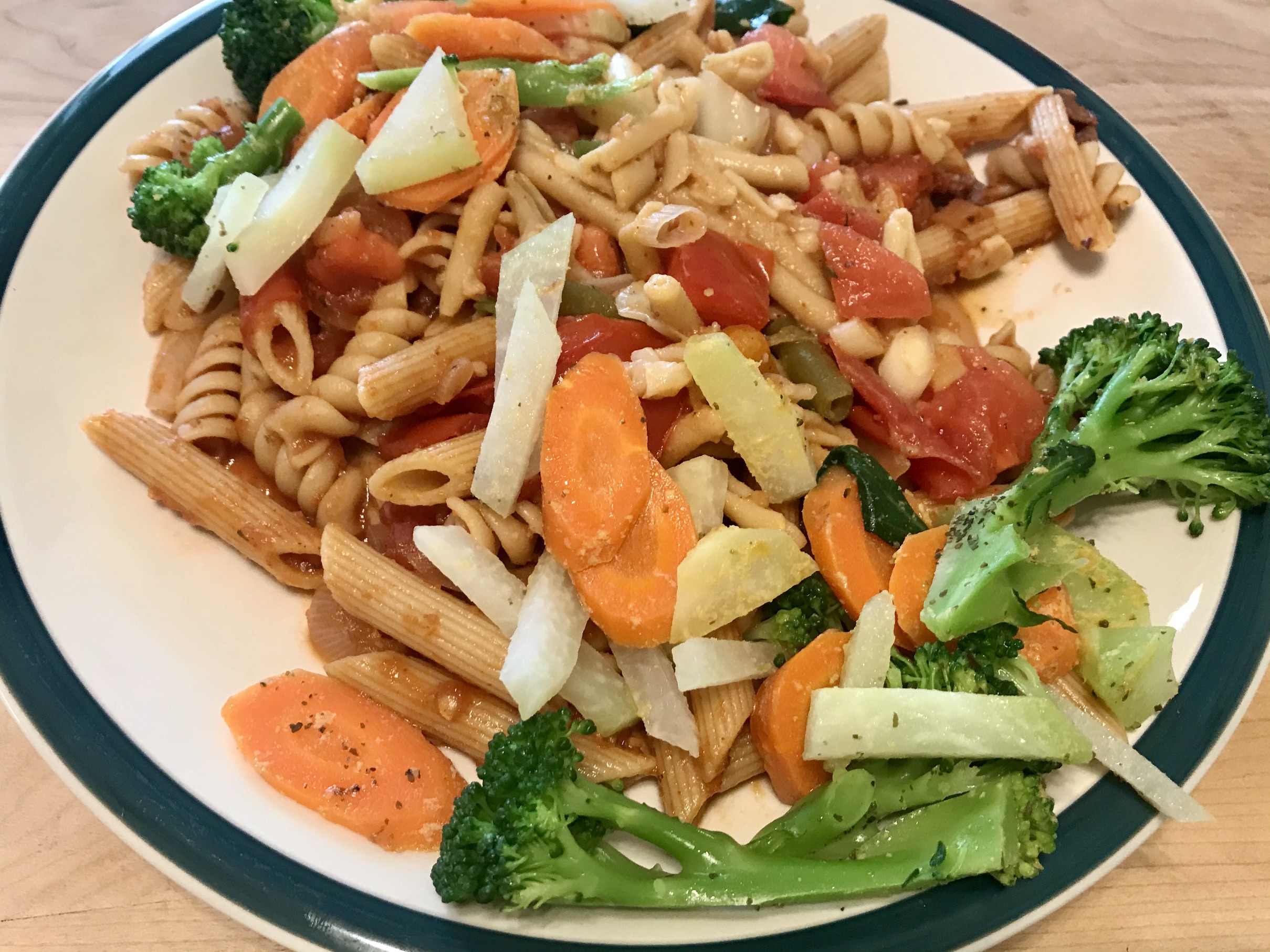 Pasta w/ Two Noodles, 100% Whole Wheat Penne + Brown Rice & Quinoa Corkscrew Noodles, Broccoli, Carrot & Kohlrabi
Pasta w/ Two Noodles, 100% Whole Wheat Penne + Brown Rice & Quinoa Corkscrew Noodles, Broccoli, Carrot & Kohlrabi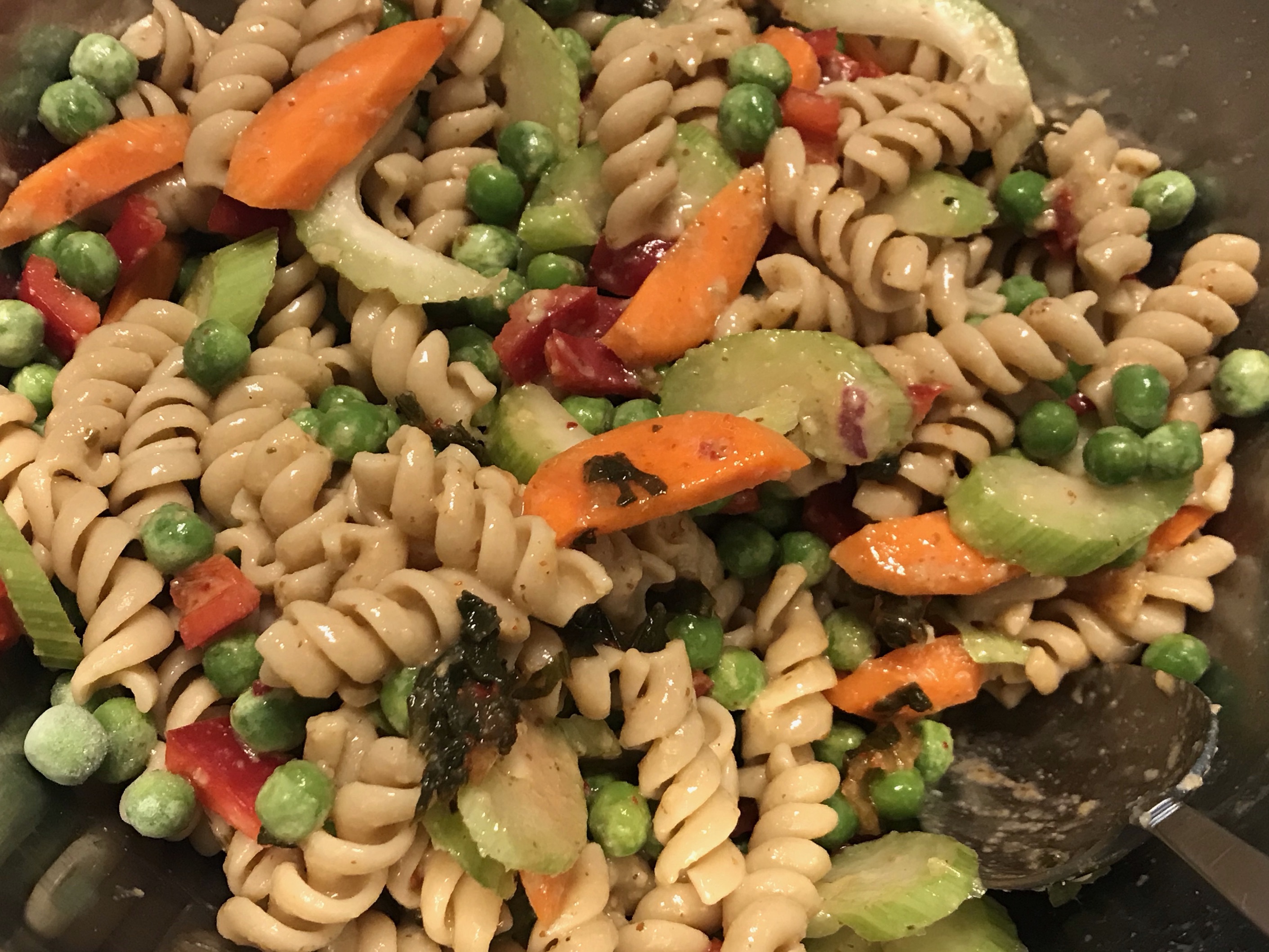 Pasta Salad with Peas, Vegetables & Whole Wheat Fusili (Corkscrew) Noodles
Pasta Salad with Peas, Vegetables & Whole Wheat Fusili (Corkscrew) NoodlesCarrots are High In Minerals
Among the many other health benefits of carrots, being a root vegetable, they are also rich in several minerals, including potassium, magnesium, calcium, sodium, and iron, with potassium found to be the most abundant.
Carrots are also good sources of Vitamin E and ascorbic acid, further boosting their antioxidant power.
J.T. Garret, author of The Cherokee Herbal, Native Plant Medicine From the Four Directions, considers carrots to be great for balancing blood sugar as they really can take the edge off when feeling a little hungry.
This jives with traditional Chinese medicine (TCM) food therapy.
According to Chinese Dietary Therapy edited by Liu Jilin and Gordon Peck, carrot has a sweet flavor and neutral nature. It can be used to aid digestion, treat indigestion and fullness of the abdomen or food stagnation, blurred vision, night blindness, and coughs due to excess heat in the lungs.
How carrots would be prepared depends upon the condition being treated.
Carrots and Glycemic Index / Load
Unfortunately, many now believe that carrots are 'too high in sugars' to be of any health benefit. This is a claim that lacks merit.
While the glycemic index ~ the affects of a food on blood sugar ~ can help provide a visual or analytical reference to foods, its usefulness falls short. For example, we don't consume foods in isolation, hence a potentially lower glycemic food consumed with a higher glycemic food will mitigate it's effects. Also, the glycemic load was introduced to better measure the total impact on blood sugar based on quantity consumed.
We personally don't pay that much attention to these types of reductionistic assertions. Nonetheless, carrots are actually a low-glycemic load.
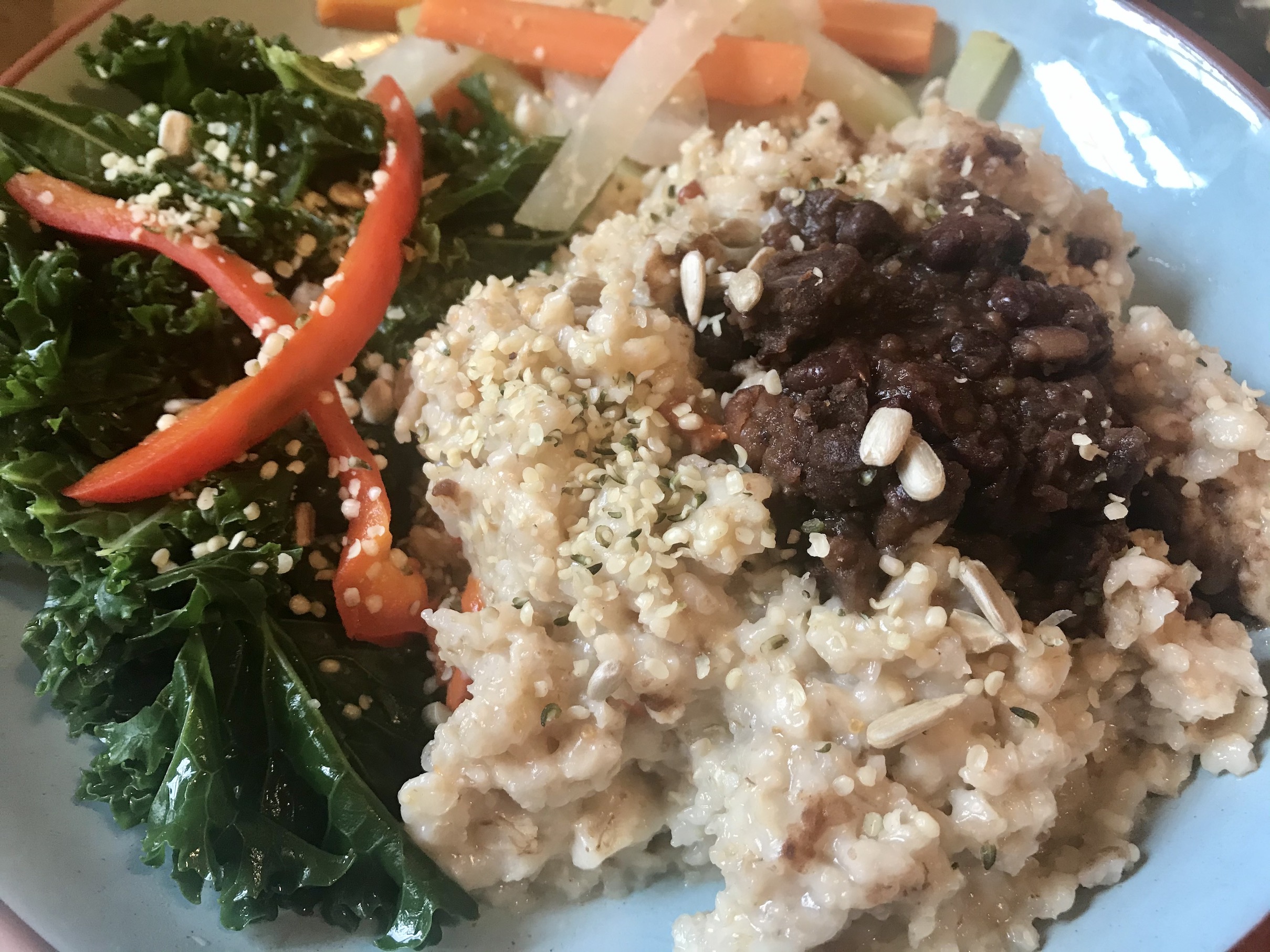 Breakfast Porridge topped with Aduki Beans, served with QB Kale, Red Bell Pepper, Carrot & Daikon
Breakfast Porridge topped with Aduki Beans, served with QB Kale, Red Bell Pepper, Carrot & Daikon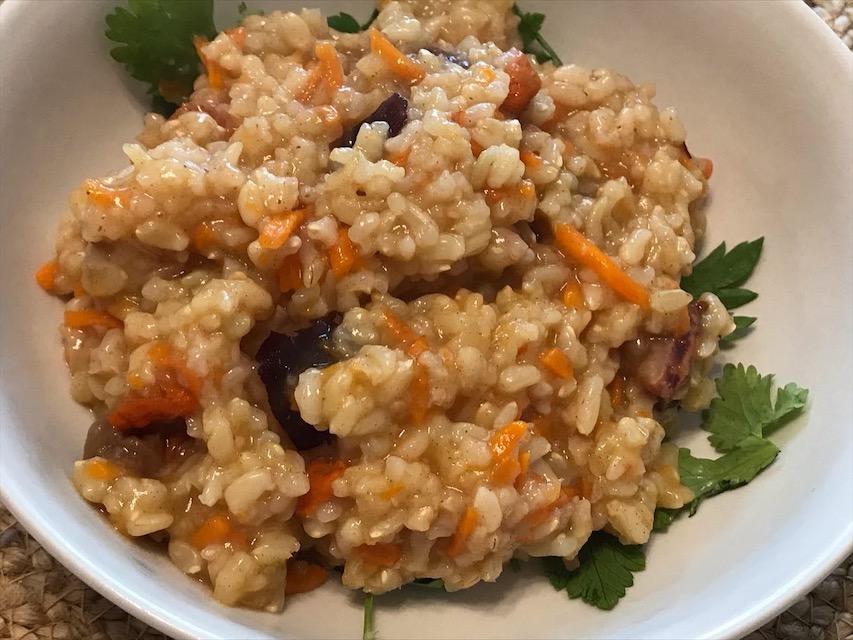 Breakfast Brown Rice Porridge with Carrot & Goji Berries
Breakfast Brown Rice Porridge with Carrot & Goji Berries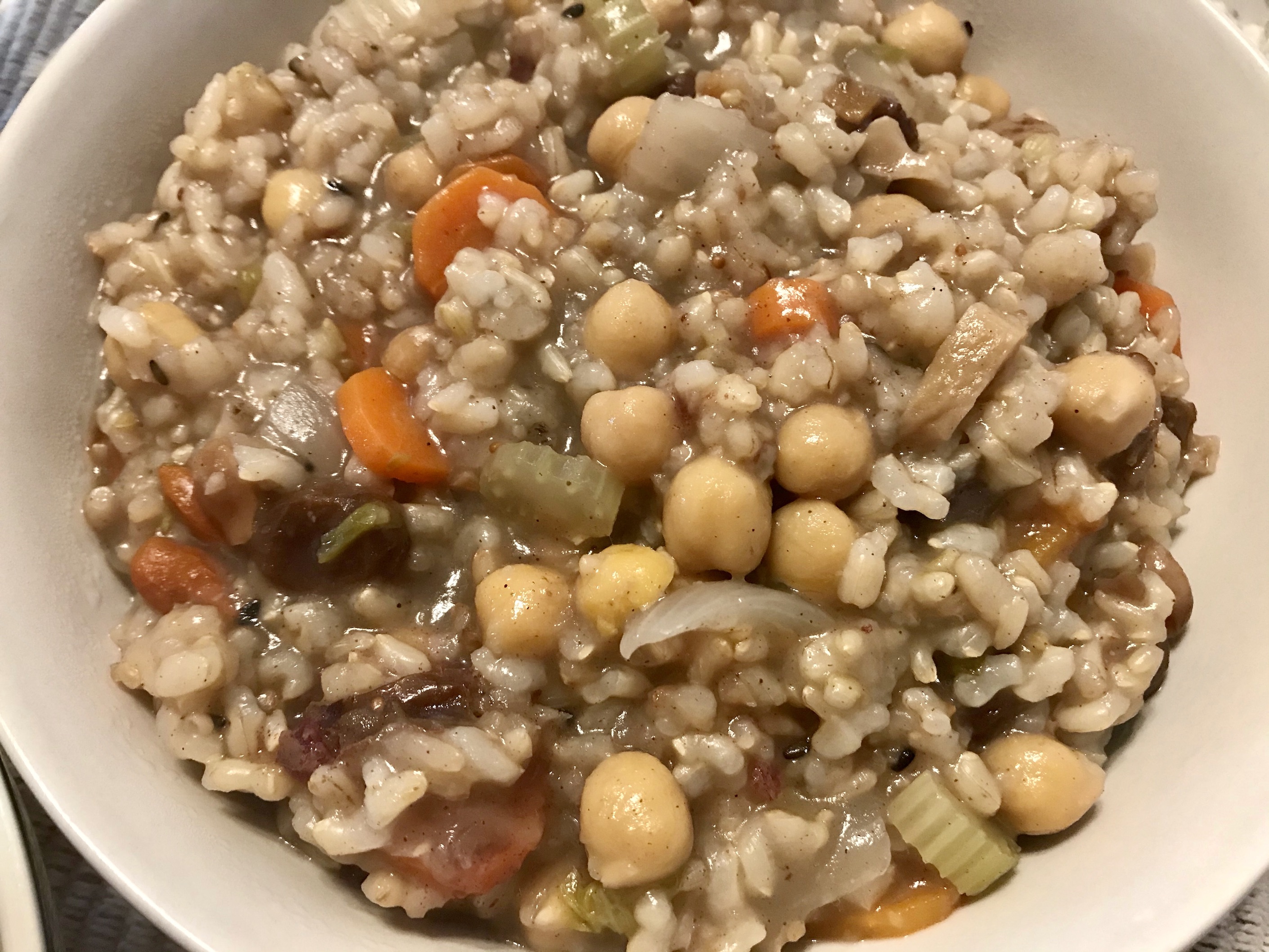 Breakfast Congee with Brown Rice, Chickpeas, Carrots, Celery & Onion
Breakfast Congee with Brown Rice, Chickpeas, Carrots, Celery & OnionWays to Enjoy the Health Benefits of Carrots!
Hopefully you are more inspired than ever to eat more carrots!
Don and I aim to consume the equivalent of 1 large carrot, or roughly 100g each ~ in addition to other carotenoid-rich foods, like winter squash, dark leafy greens, sweet potatoes, and seasonal tomatoes ~ daily!
Carrots can be juiced, blended, roasted, boiled, stir-fried, or pureed into soups.
While some of the water soluble vitamins like Vitamin C in carrots may be slightly diminished by cooking, like tomatoes, the absorption of fat-soluble nutrients including Vitamin A and carotenoids is enhanced when prepared or consumed with some healthy fat. Cooking also breaks down the cellulose walls further enhancing access to all of carrots orange, yellow, red, purple or black goodness!
Carrot Salads are an excellent way to enjoy the health benefits of carrots. It takes little time to prepare. Make a big batch to have throughout the week for a quick side dish, snack, or added to lettuce for a main salad.
According to biologist, Ray Peat, regular consumption of Carrot Salads can help flush out excess estrogen to prevent being reabsorbed into the system. The net result of regular consumption is to regulate hormone and thyroid function.
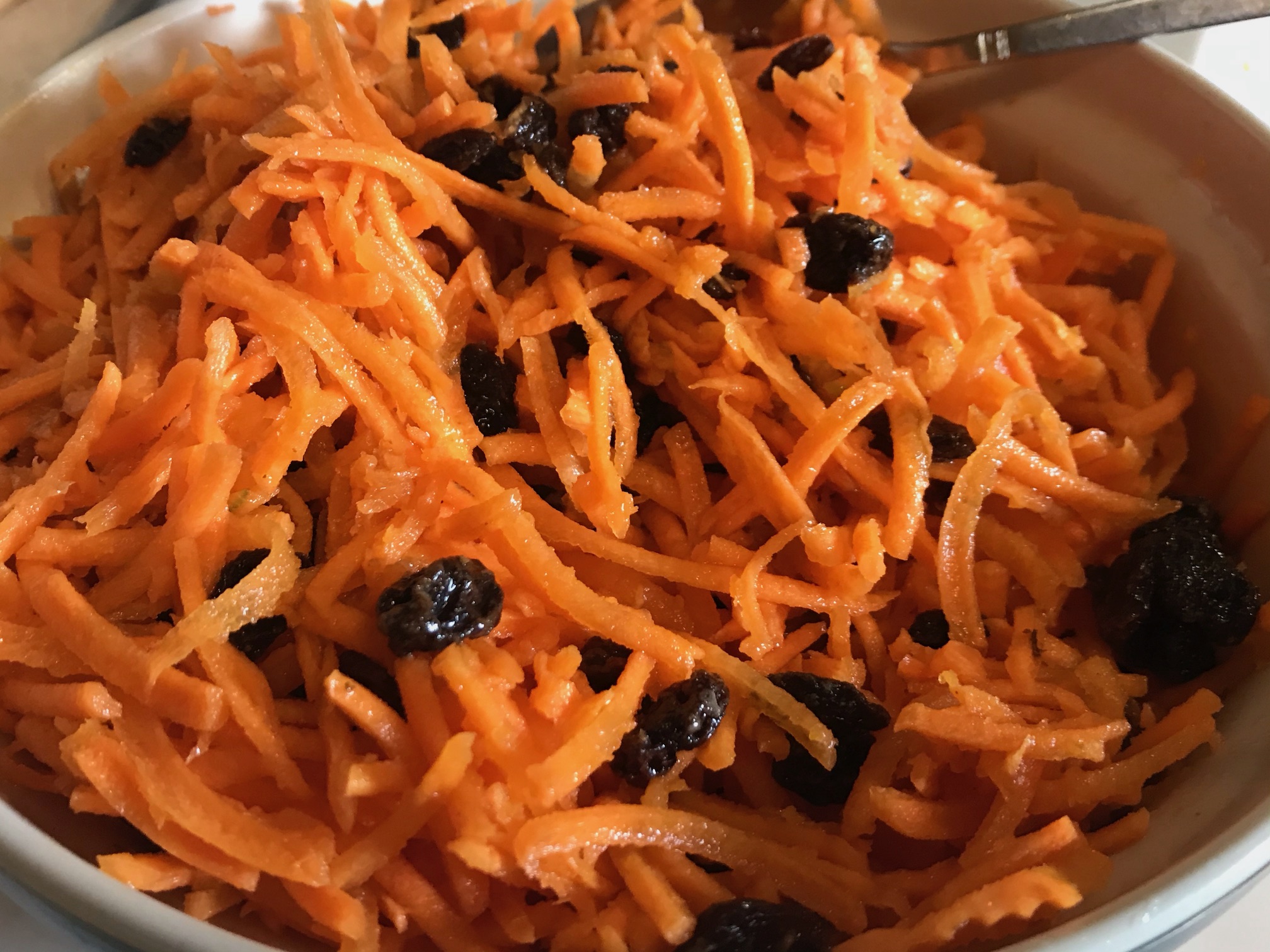
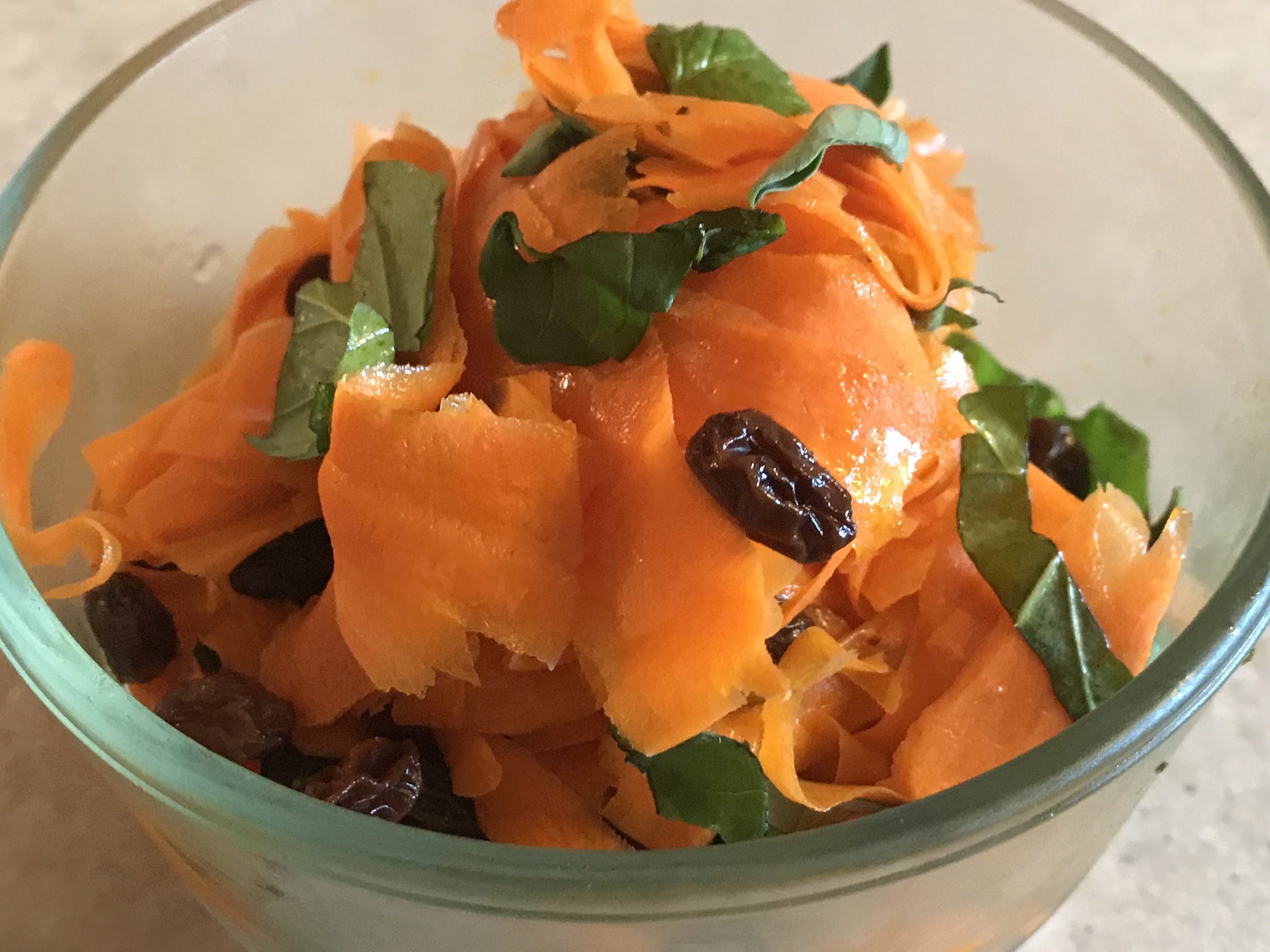
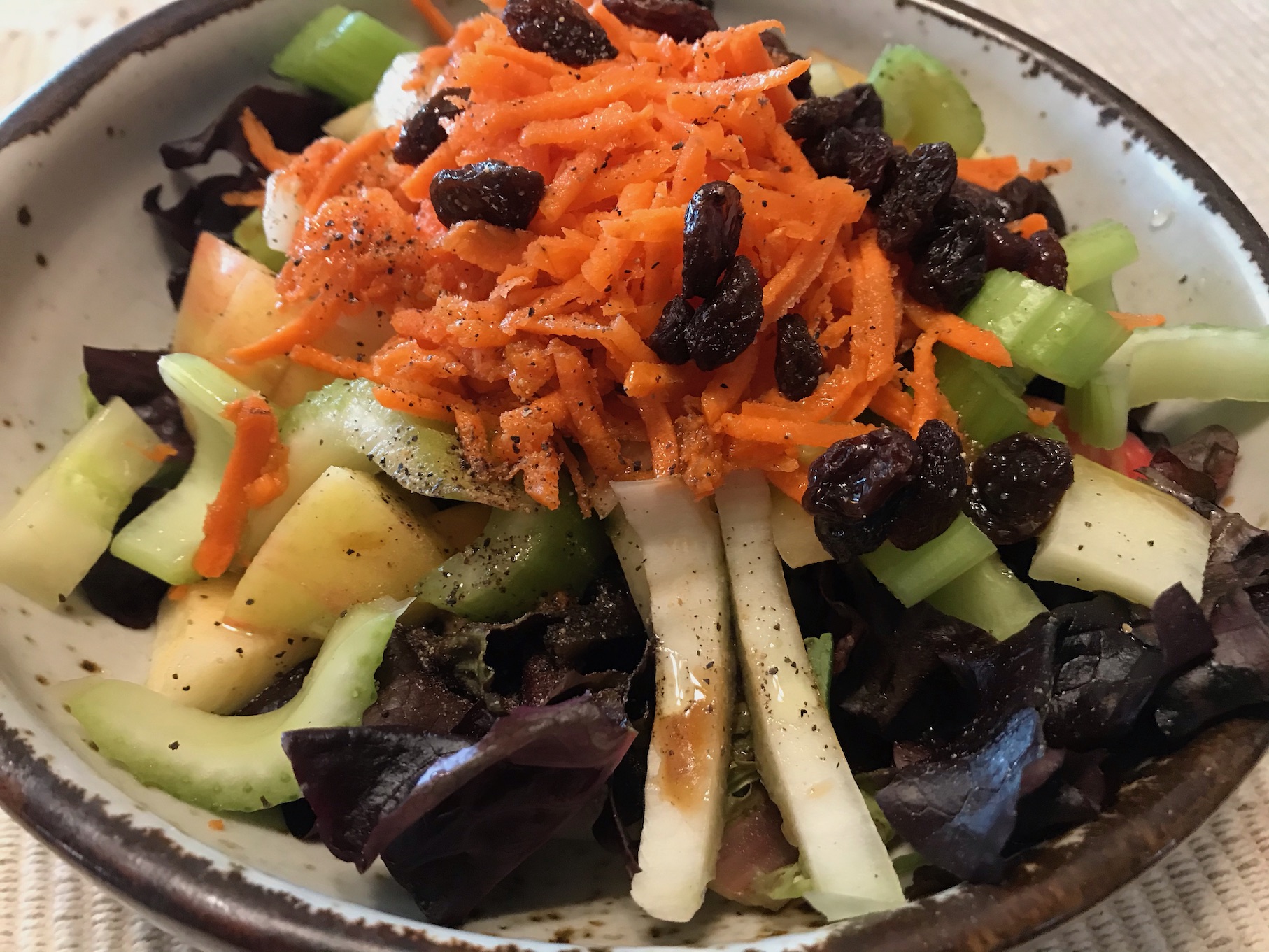
More Cooking with Carrots Inspiration...
Carrots are excellent simmered in water with ginger and a peeled apple, then pureed into a soup, or simply puree cooked carrots seasoned as desire ~ sweet or savory, using ginger, cinnamon, nutmeg, and a pinch of clove or allspice, or a bit of garam masala and/or cumin and a pinch of cayenne pepper. Serve as a side dish in lieu of mashed potatoes.
Alternatively, roast carrots alone or with other vegetables or potatoes, or braise them in a little apple cider or orange juice, with a touch of sweet curry, white or black pepper, and a little optional brown rice syrup or other sweetener. Add a drizzle of toasted sesame oil, or garnish with toasted sesame seeds.
Carrots are also good with a blend of toasted sesame oil, brown rice vinegar, a little reduced sodium tamari, and a touch of optional brown sugar (I like Wholesome Organic Fair Trade Dark Brown Sugar.)
(For all my preferred condiments for savory plant-based / macrobiotic cooking, click here.)
One more way to enjoy more of the many health benefits of carrots is to simply add chopped carrots ~ as a base, or star ingredient ~ to any soups, such as Carrot Soup, Lentil Soup, Vegan Split Pea, Yellow Split Pea, White Bean Squash & Kale, or Miso Soups. (Look for my Macrobiotic Meals & Recipes FREE E-book to come in 2024!)
Carrots are also great added to stir fries, or Quick Blanched (QB) with other greens and vegetables for helpful, flavorful plant-based vegetable meal prep. I actually prefer to munch on QB (Quick Blanched) carrots more than raw. They are great for adding to a crudite platter, served with a dip, or rolled into Veggie Sushi.
Grated or finely diced carrots help sweeten bean dishes, or tomato sauces, which is why I often add some to my healthy, homemade Slightly Spicy Veggie Marinara Sauce.
I even occasionally add chopped carrots to my morning Porridge or Congee. (Look for my Whole Grains Cookbook, 2024.)
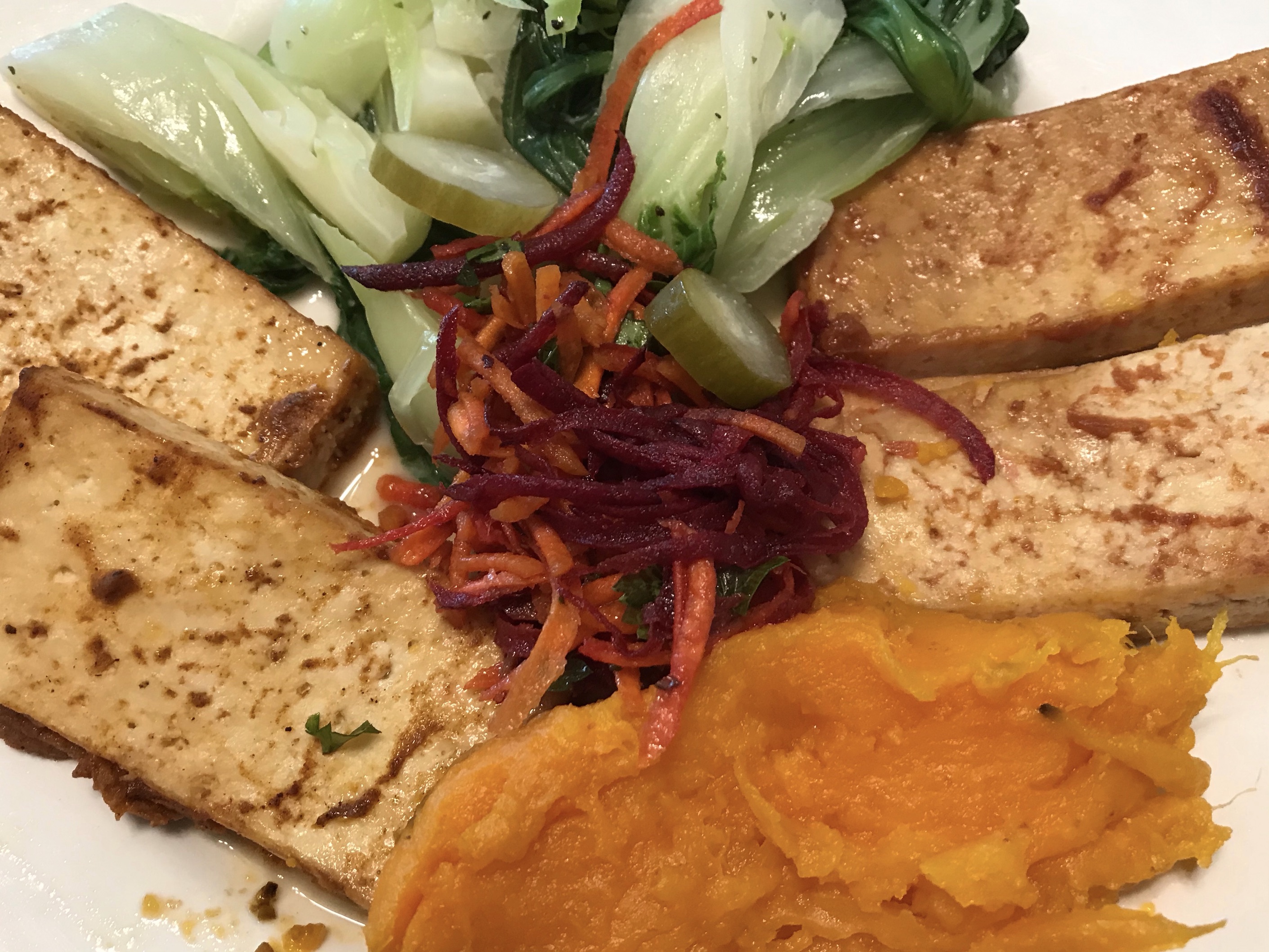 Baked Tofu with Winter Squash, Carrot Beet Salad and Baby Bok Choy
Baked Tofu with Winter Squash, Carrot Beet Salad and Baby Bok Choy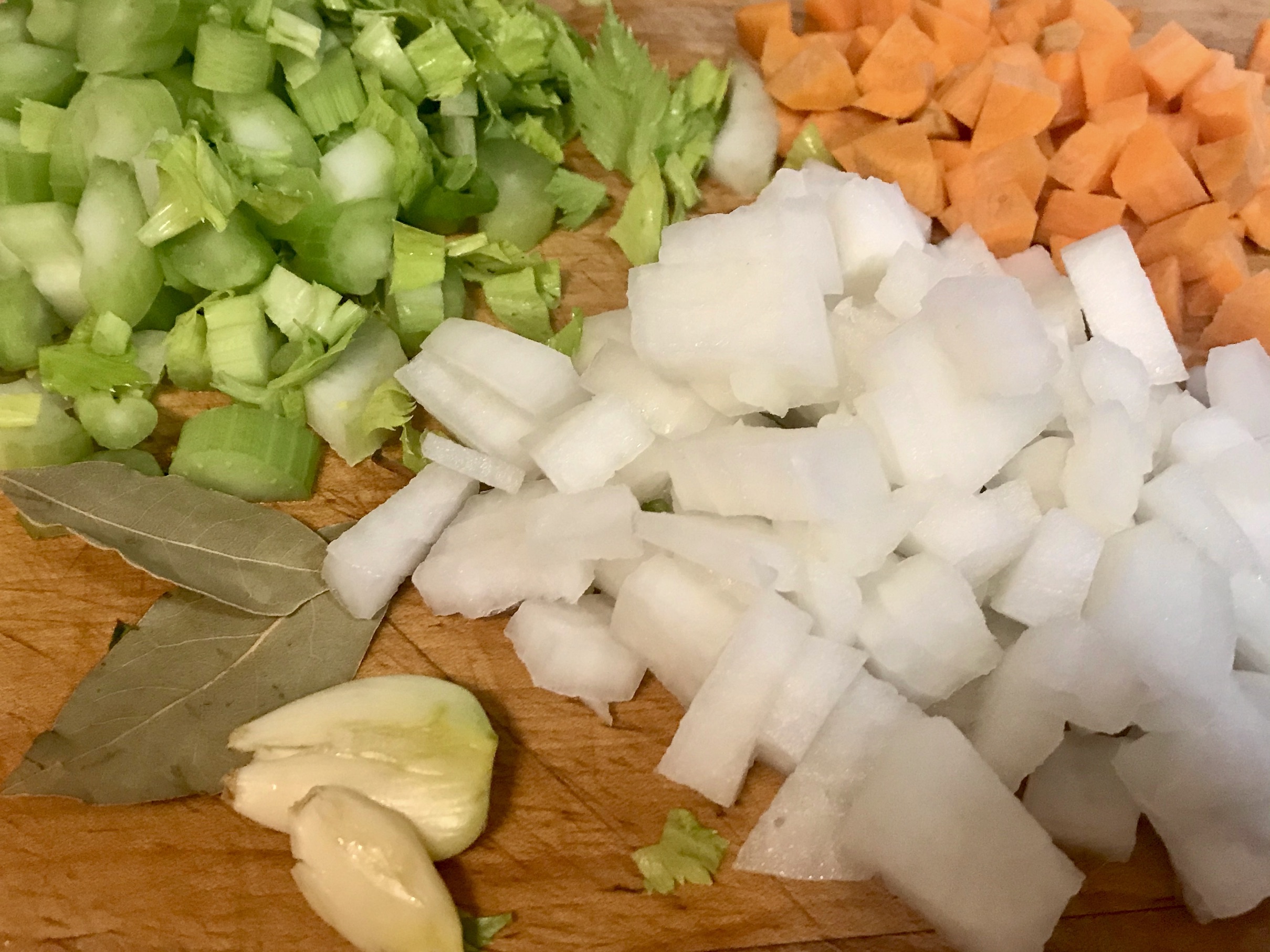 Prep for making Split Pea Soup
Prep for making Split Pea Soup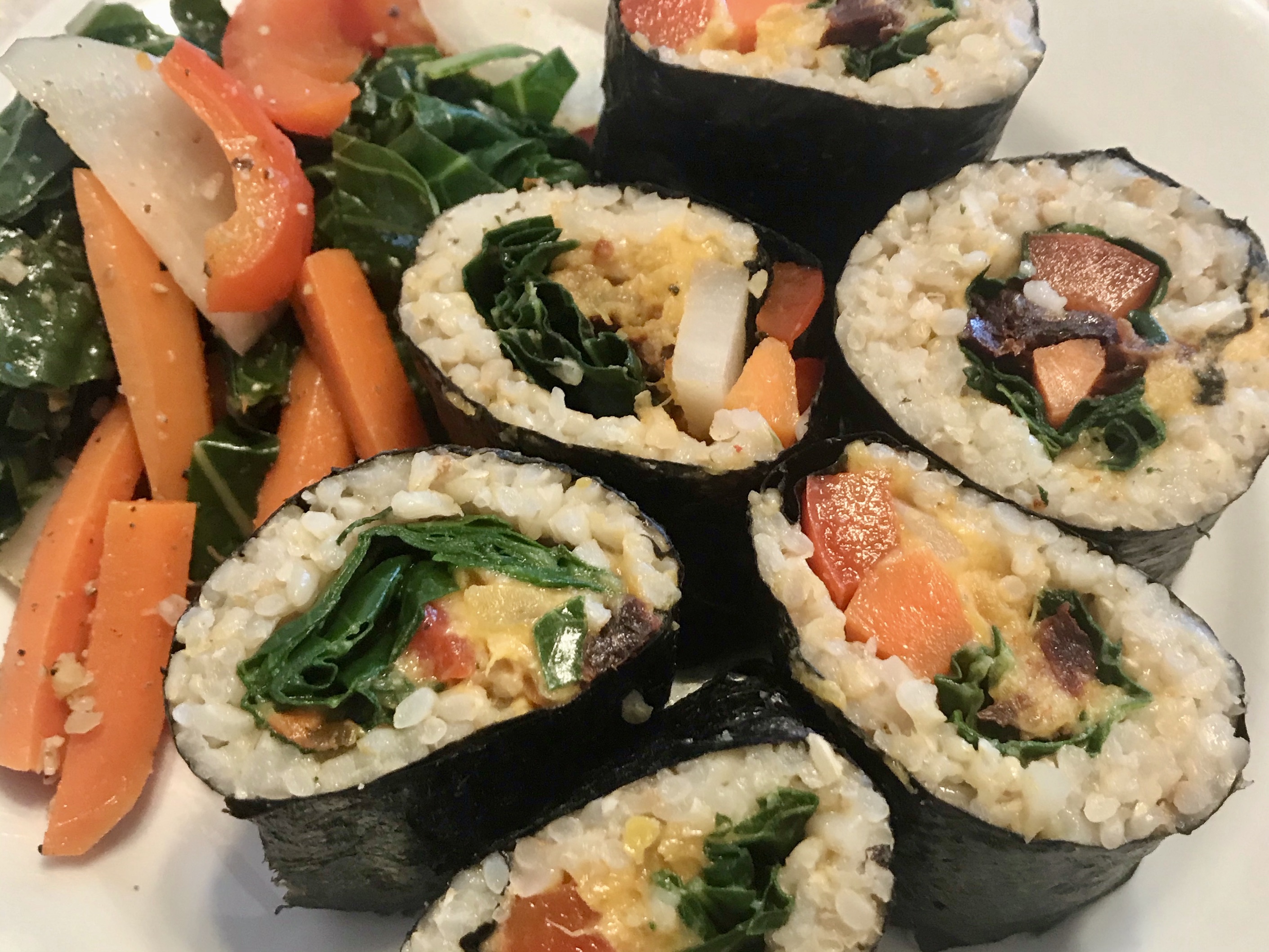 Brown Rice & Vegetable Sushi with QB Carrots rolled inside, and on the side
Brown Rice & Vegetable Sushi with QB Carrots rolled inside, and on the side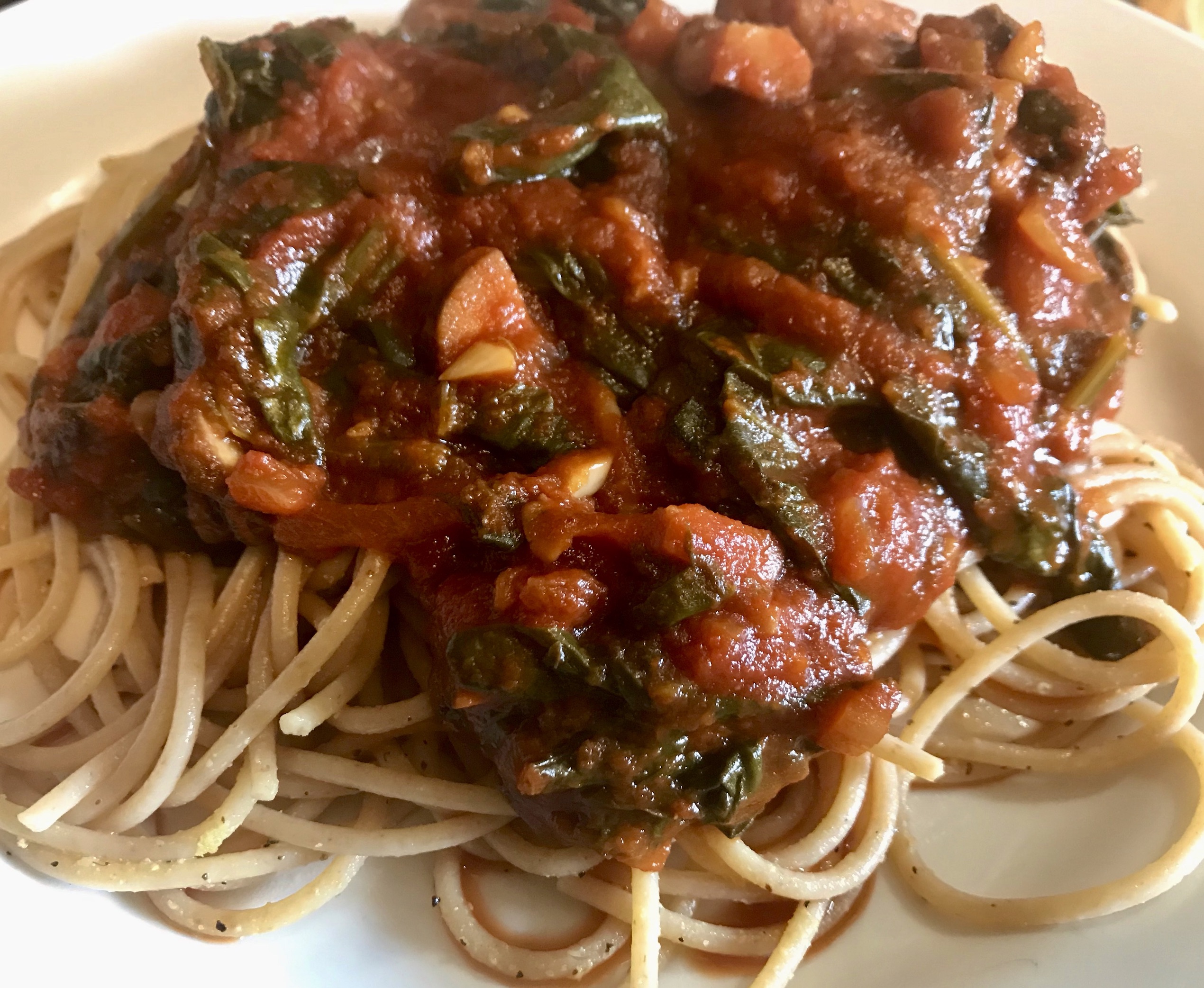 Healthy Homemade Slightly Spicy Veggie Marinara Sauce over Chickpea Pasta
Healthy Homemade Slightly Spicy Veggie Marinara Sauce over Chickpea PastaTo extract all the health benefits of carrots, including the fiber, Don blends (rather than juices) 2 large, or roughly 200g of carrots in our Vitamix with about 1 cup of local apple cider, and a couple thin slices of ginger.
Prior to training, we also add a beetroot, a good source of dietary nitrates which are getting a lot of attention lately for its ability to enhance sports performance and recovery.
You can watch as Don makes our morning Carrot Beet Elixir for our pre-training workout 'fuel' along with our entire day of meals, training, and daily exercise routine.>>>
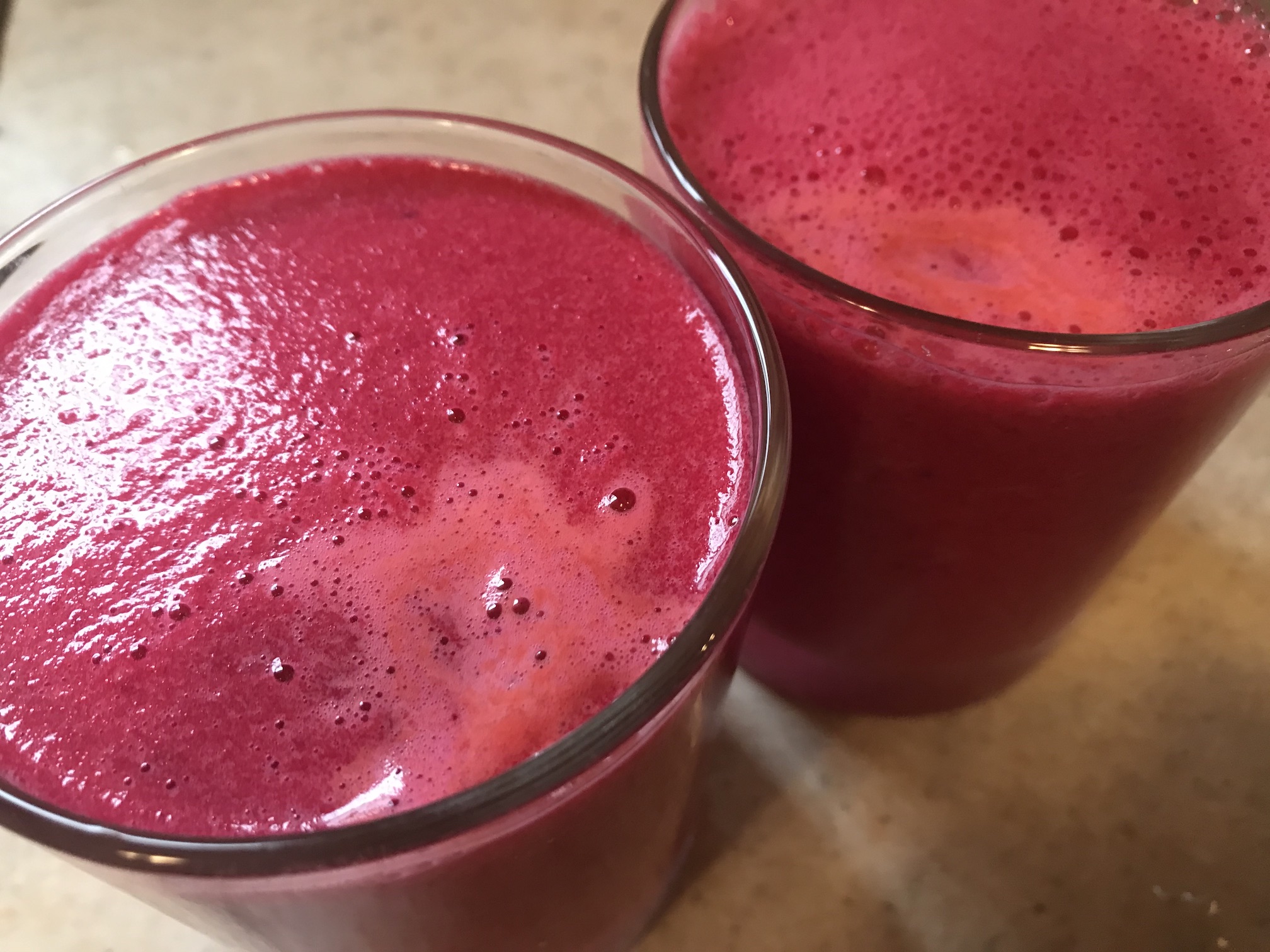
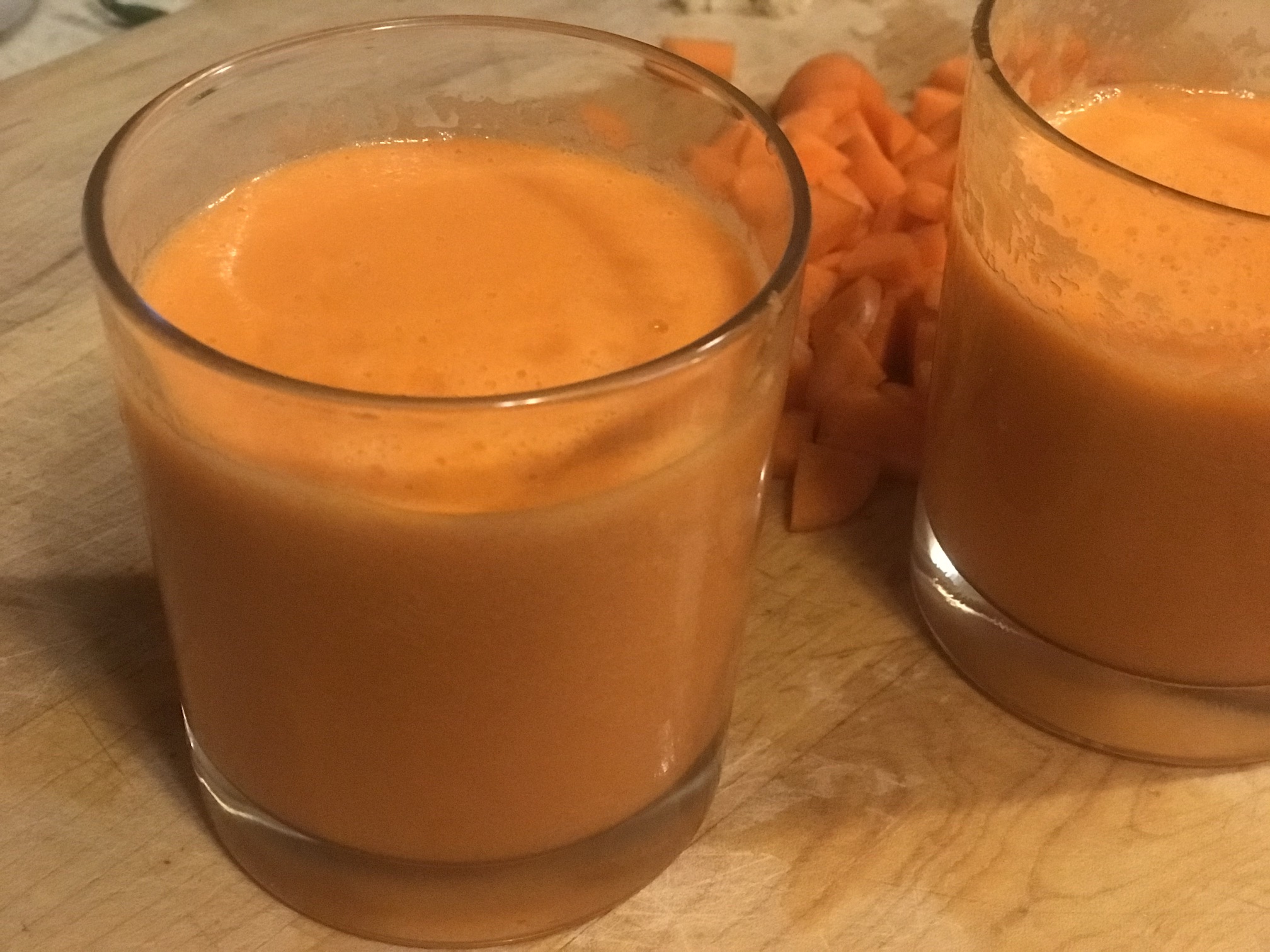
Resources
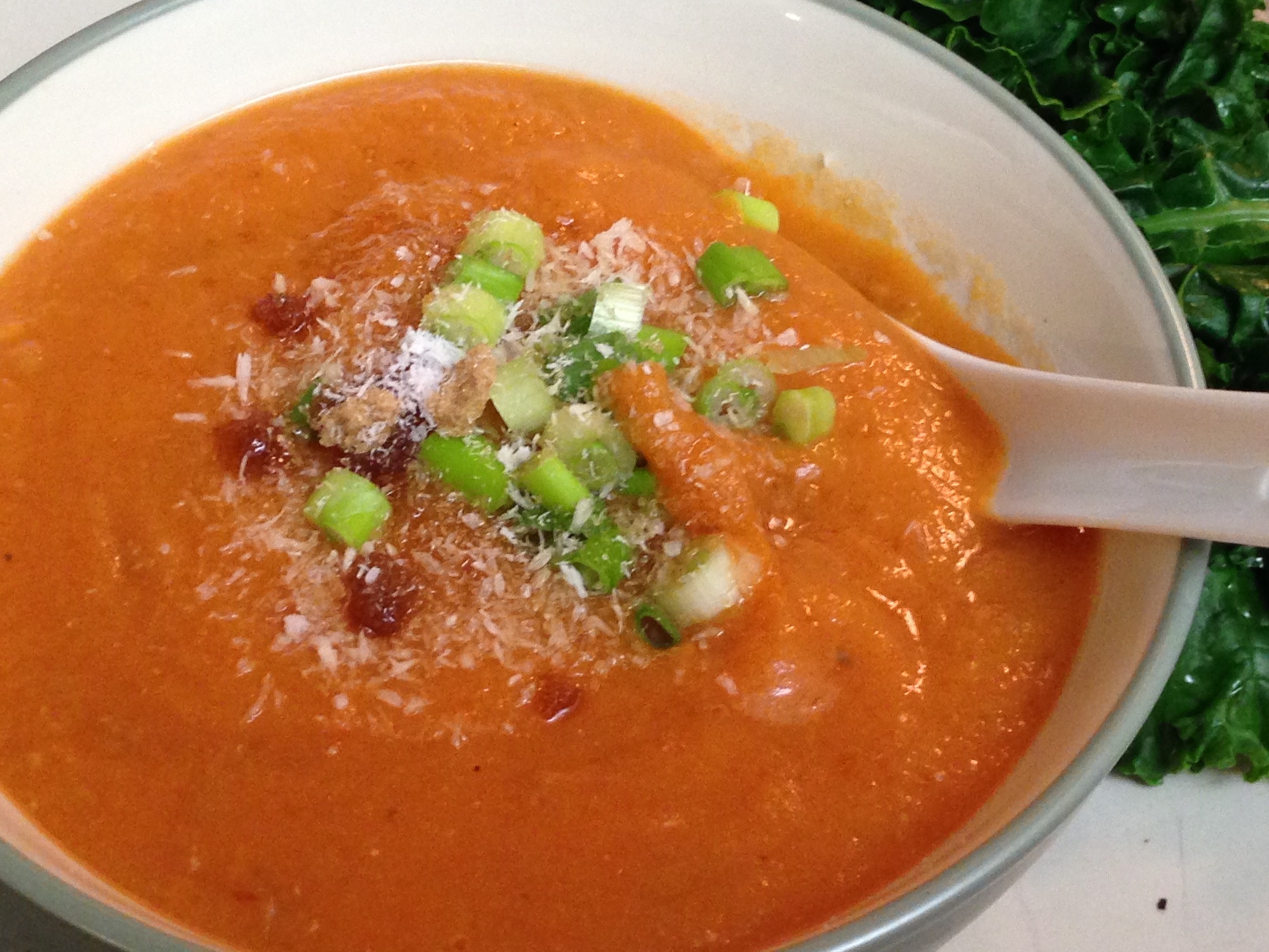 Carrot Soup w/ Side of Greens
Carrot Soup w/ Side of Greens